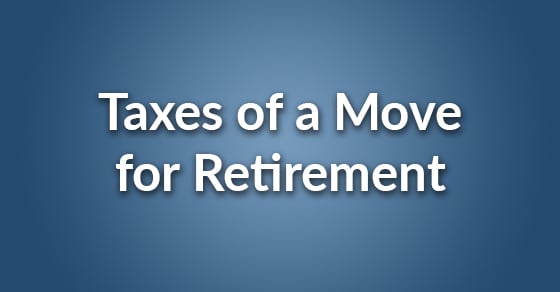
Many people look to move to another state in retirement. There are lots of good reasons to do this but make sure to check the tax obligations first. Here are some tips to think about before moving.
Find Out the Full Tax Picture
Heading to a state with no personal income tax, like Florida, might seem like an easy decision but that isn’t always the case. You’ll want to take into account other taxes like property and sales tax.
It’s also worth checking what types of income are or aren’t taxed. Some states don’t tax Social Security but might tax interest or dividend income.
Estate Tax
If this is your last planned move then what happens to your money after you’re gone is worth considering as well. The new federal estate tax levels might be above a majority of people ($11.4M single or $22.8m married) but states might have a much lower level. There may also be inheritance tax levied.
Remember to Establish Domicile
If you aren’t a legal resident of your new home you could get stuck paying taxes in both your new and former states. Obviously you’ll want to avoid that. The way to do that is by establishing legal domicile – going all in on your new state and cutting ties with your old one. While the rules change from state to state here are a few general things you can do to help ensure you don’t get double taxed:
- Real estate – buy or rent a new home and either sell or rent your old one. If you rent your old house make sure it’s to someone unrelated to you,
- Change your legal address on passports, insurance policies, will or living trust documents, and other important documents,
- Register to vote, get a driver’s license and register your vehicle in the new state, and
- Open and use bank accounts in the new state and close accounts in the old one.
Consult an Expert
Before deciding where you want to live in retirement, do some research and talk to a personal tax professional in your targeted new state.
